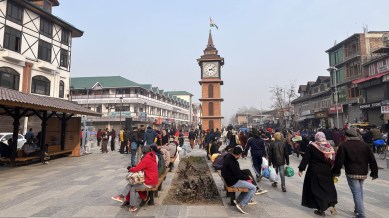Stay updated with the latest - Click here to follow us on Instagram
Article 370: 4 years after J&K special status scrapped, Supreme Court verdict today
On September 5, a five-judge Constitution Bench presided by Chief Justice of India D Y Chandrachud had reserved its judgment after hearing the petitioners, the Centre and J&K administration for 16 days.

OVER FOUR years after Jammu and Kashmir (J&K) lost its special status following the abrogation of Article 370, and the state was reorganised into the two Union territories of J&K and Ladakh, the Supreme Court on Monday is scheduled to deliver its verdict on a batch of petitions challenging the constitutional validity of the Centre’s decision.
On September 5, a five-judge Constitution Bench presided by Chief Justice of India D Y Chandrachud had reserved its judgment after hearing the petitioners, the Centre and J&K administration for 16 days. The Bench includes Justices S K Kaul, Sanjeev Khanna, B R Gavai and Surya Kant. Justice Kaul will retire on December 25 while the other three Judges are in line to be the Chief Justice of India.
monthly limit of free stories.
with an Express account.
The court heard a clutch of 23 petitions. These included some which were filed before the August 5, 2019 changes, challenging Section 35A of the Constitution that empowered J&K to make special laws for its permanent residents.
Some of the petitioners, who commenced arguments on August 2, submitted that Article 370 was meant to be temporary, only until the Constituent Assembly for the erstwhile state took a decision, one way or the other. But with the term of the Constituent Assembly having expired in 1957, the provision became permanent and could not be touched by any constitutional process whatsoever, they said.
The petitioners contended that there was no merger agreement signed between the Union of India and the then Maharaja of J&K but only an Instrument of Accession (IoA), and, therefore, there was no surrender of sovereignty. They argued that the IoA limited Parliament’s power to make laws for the state so as to ensure that its subjects would have a greater say.
The petitioners contended that the manner in which the special status was scrapped, by way of Presidential orders dated August 5 and 6, 2019, while J&K was under President’s Rule, amounted to a fraud on the Constitution.
Rubbishing the charges, the Centre and the J&K administration maintained that due process was followed in making the changes. Countering the petitioners’ argument on how Parliament could assume the role of the Constituent Assembly, the government said the words ‘Constituent Assembly’ in Article 370(3) can be read only as “Legislative Assembly”.
The Centre contended that during President’s Rule, the powers of the J&K Assembly stood vested with the Parliament, which was, therefore, within its powers to legislate for the state.
They termed the changes made to Article 370 as “historic” and said it had “brought unprecedented development, progress, security and stability to the region, which was often missing during the old Article 370 regime”.
During the hearing, the Bench too posed questions on the claim of the provision becoming permanent and wondered why it was then placed in Part XXI of the Constitution which deals with “temporary, transitional and special provisions”.
Among the petitioners were IAS officer Shah Faesal and activist Shehla Rashid. They, however, withdrew themselves before the hearing started.